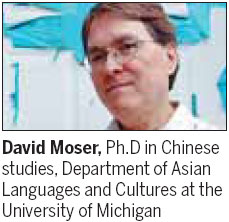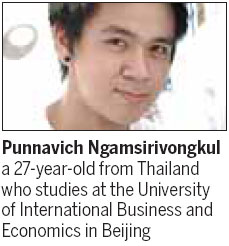
It's more for adults than children
I participated in China Central Television's 1999 Spring Festival gala in a crosstalk (a form of humorous dialogue) show with Mark Henry Rowswell - who's known in China as Dashan ("Big Mountain") - and other expats, including some from the former Yugoslavia and some from Africa. At the time, we were all students of Ding Baoquan, a crosstalk master.
It was the first and busiest New Year I have spent in China. I performed on the stage and my wife and our 2-year-old daughter sat in front of the TV watching the show.
Every act had to rehearse and perform run-throughs. Every time we did a run-through we changed the script by adding something. We rehearsed for weeks and weeks; the process took two months in total.
It was like learning a new story every time. During the final two weeks, we had to stay all day, just rehearsing. The original script was 15 minutes long, but in the end it was cut down to just four minutes. It was tiring. Everyone was paid the same: 1,000 yuan ($165), no matter how famous you were.
When we finished the show and walked out on the street, it was interesting to realize that the program had been seen by 800 million people all over China. I received many phone calls, including a strange one from a good friend of mine. "You were the least funny in the show," he said, jokingly. However, I thought he was very frank about it.
Most of the time I spend Spring Festival with my wife and her family in Huaishui, Hebei province. We used to take a long-distance bus to her hometown, but now family members pick us for the two-hour car ride. During the holidays we are always overloaded with food and sometimes there is just too much. We have a lot of relatives in Hebei, but there's no shower and the heating system is poor. It's cold and I guess I just liven up with the energy provided by the food.
When I first arrived in China in the 1980s, there were few raw or fresh vegetables during the northern Chinese winter; all the vegetables were cooked. Then, as living standards improved, people began to eat a greater variety of food, even though everything was oily. However, in the past five to 10 years, I've noticed that things have started to change and people eat far more healthily now.
Chinese Lunar New Year is more about adults than children. My daughter used to prefer Christmas because it's much more child-oriented, with lots of candies and gifts - it's more fun and enjoyable. In China, people give each other hongbao (red envelopes containing money) as gifts and that doesn't mean as much to kids.
David Moser was talking to Zhang Yuchen.

A time for silence and for hongbao
One of my grandfathers was from Guangdong, so our family also celebrates Spring Festival in Bangkok, but we don't make the dumplings ourselves, we buy them instead. We also go to Bangkok's Chinatown for dinner.
As in China, Spring Festival is a time for hongbao (a red envelope containing a gift of money). My parents and relatives gave them to me during Chinese New Year when I was a student in Thailand, so when I started working there, it was my turn to give something back.
When I worked in Thailand, I also got hongbao from the company. The CEO's family was from China, but some other companies (without Chinese managers) also do that. So, some Thais are given two bonuses a year - before Western New Year and at Chinese New Year. However, no bonuses are given out during Songkran, the Thai New Year, which is interesting.
Chinese New Year is not a public holiday in Bangkok, but the students with Chinese ancestry are free to stay home and celebrate the festival with their family. I took every chance to enjoy the holiday. Some of my Thai friends, who have no Chinese blood, also made full use of the chance to enjoy themselves.
During Songkran, we just splash water on each other. So from my perception, Chinese New Year is about family gatherings, shopping and money, while Thai New Year is all about having fun.
I came to study in Beijing in November 2011 and spent Chinese New Year with my Thai friends. We tried to make some dumplings but they turned out a mess. They were very salty and no one wanted to eat them. So we said "OK, just leave them there" and decided to go out.
We took the subway to Dongzhimen and a few other places. Many people had traveled to their hometowns, so there were few people on the streets and it was so silent. In normal times, Beijing is so crowded and exhausting. At that time, it just looked like a different city and was lovely.
We ran down the street and screamed - we just felt free like never before. I used to be a dancer, so I danced on the train and my friends recorded a video of me. The train was almost empty, but I didn't care, anyway.
This year, I may spend a couple of days at the homes of Chinese friends in Beijing. But I also plan to dance on the train again - it feels so cool.
Punnavich Ngamsirivongkul was talking to Tang Yue.
|
|
|
|
|
|
|
|
